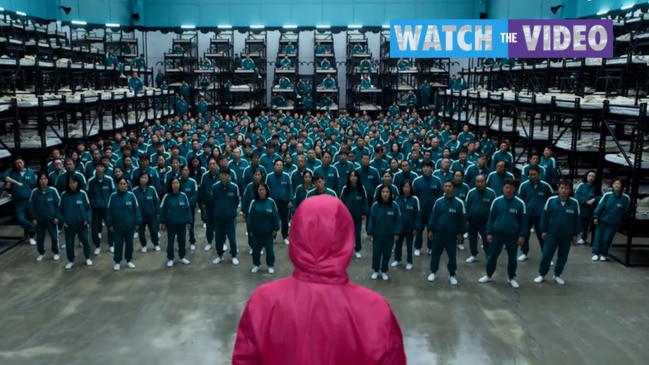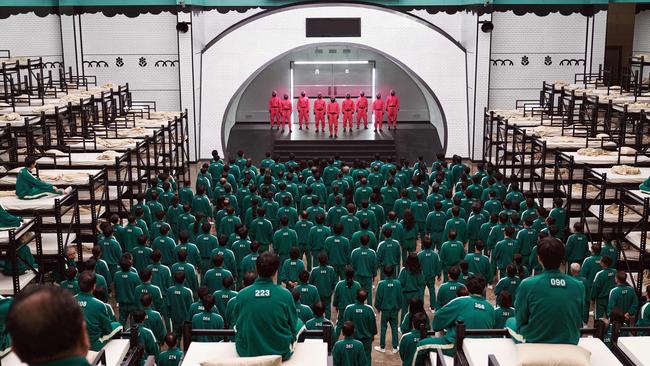Lessons Victorians can learn from Squid Game
The hardship endured by locked-down Melburnians is nothing compared with everyday privations of working-class Koreans.

Susie O'Brien
Don't miss out on the headlines from Susie O'Brien. Followed categories will be added to My News.
Squid Game probably was not the best choice for a mid-week family movie night with the kids.
I picked it because I’d heard it was a show based on children’s games, but didn’t realise Netflix’s newest hit is also its most violent. In this dystopian drama you see bullets tearing through bodies and people being gunned down, spurting blood and gore as they run for safety.
The story is based around a group of 456 desperately poor Korean men and women who are down on their luck and choose to compete in a series of six games.
If they win, they will get $50m. If they lose, they will be eliminated.
But there’s a catch. Getting eliminated doesn’t mean shedding mascara in the back of a limo, like in The Bachelor. In Squid Game, when you’re eliminated, you die.
In the first episode I watched with the kids this week, that meant getting shot at point-blank range for moving at the wrong time during a fun little game of Red Light, Green Light.

In the second game, contestants who failed to snap a shape out of a honeycomb biscuit without breaking it were shot in the head.
Games of skill and chance are intertwined on the show, leaving contestants never knowing when they’ll win and stay alive, or lose and die.
Forget Netflix’s other No. 1 show, Bridgerton; this is more like It’s A Knockout with real weapons where the losing characters get clubbed to death.
We once talked about South Korea’s other major cultural
“k-pop” export Psy and his gyrating hit Gangnam Style. Now it’s all about “k-drama” and Squid Game.
Suddenly everyone’s talking about Korean childhood games, sharing recipes for honeycomb biscuits and planning Squid Game Halloween outfits.
Lead actor Kang Sae-byeok is now even a global ambassador for Louis Vuitton, no doubt pleased at not having to wear blood-splattered clothes for a change.
There’s endless commentary about the nine-episode series, from feminists lamenting the “screen time devoted to the dudes” to toffs describing it as an “extreme parable of neoliberalism and its dehumanising, competitive capitalist system”. Others have settled for “seriously addictive” and “deliciously bingeable”.
I’m left wondering how – in the middle of a global pandemic where millions have died and millions more are suffering – Squid Game can be on track to be the most-watched original Netflix show ever.
Creator Hwang Dong-hyuk has been trying to make this show for more than 10 years, and he says he finally got the green light because people “started to realise that gruesome and gore is actually exactly what the world wants”.
It seems odd that such a violent show appeals at a time when the world is so dimmed and diminished by tragedy and illness.
But perhaps this is the key to its astounding popularity; it puts our own suffering into perspective.
While many are undoubtedly doing it tough, in Victoria over the past 18 months most people have suffered by staying home and eating takeaway. Our hardship, even in the middle of a global pandemic, is nothing compared with everyday privations of working-class Koreans.
The show works because it’s set against the backdrop of life-threatening Korean class-warfare and poverty. It’s a country run by billionaire despots where the suicide rate is highest in the OECD and the unemployment rate is 22 per cent.
It’s the kind of place where daily life is so tough that you can actually imagine people risking their lives for a life-altering payout. The back stories of the characters reflect the bleakness and brutality of Korean life, particularly the main character who steals from his sick mother and gets his daughter’s birthday present from a vending machine.
This show is worth watching, but probably not with your kids, and definitely not with your grandma if her pacemaker is on the blink.
If full-on violence isn’t your style, it’s probably best to stick with The Bachelor. Maybe even revisit bodice-ripping Bridgerton – fewer blood-stained outfits and not so many bodies on the floor.
I know one thing for sure. You’ll never wear another green and white tracksuit again.




